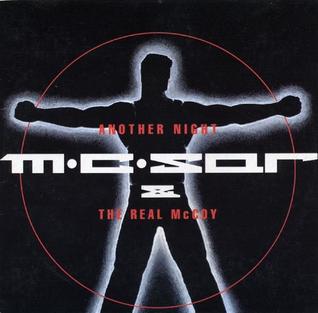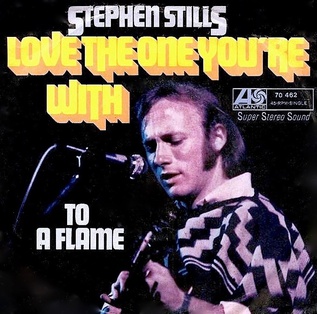
Doubt is the second album by British rock band Jesus Jones, released on 21 January 1991 through Food Records. The label witnessed the success of their debut album Liquidizer (1989) and wanted more hit-sounding music from the band. Frontman Mike Edwards wrote new material on their tour bus and in hotel rooms; they recorded some of it in early 1990, before touring resumed. After the conclusion of a tour of the United Kingdom, the band spent a week in May 1990 recording the bulk of their next album at Matrix Studios in London. Edwards produced the majority of the tracks, with Food Records co-founder Andy Ross and Martyn Phillips producing one song each.

"You Keep Me Hangin' On" is a song written and composed by Holland–Dozier–Holland. It was first recorded in 1966 by American Motown girl group the Supremes, reaching number one on the Billboard Hot 100. American rock band Vanilla Fudge released a cover version in June the following year, which reached number six on the Billboard Hot 100. English singer Kim Wilde covered "You Keep Me Hangin' On" in 1986, reaching number one on the Billboard Hot 100 in June 1987. In the first 32 years of the Billboard Hot 100 rock era, "You Keep Me Hangin' On" became one of the six songs to reach number one by two different musical acts. In 1996, American country singer Reba McEntire's version reached number two on the US Billboard Hot Dance Club Play chart. The BBC ranked the Supremes' original song at number 78 on The Top 100 Digital Motown Chart, which ranks Motown releases by their all-time UK downloads and streams.

"I Will Survive" is a song by American singer Gloria Gaynor, released in October 1978 as the second single from her sixth album, Love Tracks (1978). It was written by Freddie Perren and Dino Fekaris. A top-selling song, it is a popular disco anthem, as well as being certified Platinum by the Recording Industry Association of America (RIAA).

"I'm Every Woman" is a song by American singer Chaka Khan, released as her debut solo single from her first album, Chaka (1978). It was Khan's first hit outside her recordings with the funk band Rufus. "I'm Every Woman" was produced by Arif Mardin and written by the successful songwriting team Nickolas Ashford and Valerie Simpson. The single established Chaka's career outside the group Rufus, whom she would leave after their eighth studio album Masterjam was released in late 1979.

"Another Night" is a song by German Eurodance and pop music project Real McCoy. The single is featured on their hit album, Another Night (1995), which was the American release of the project's second album, Space Invaders. The song was written and produced in Germany by Juergen Wind and Frank Hassas (Quickmix) in 1993 under the producer team name Freshline.

"Beautiful Life" is a song by Swedish band Ace of Base, released on October 20, 1995 from their second album, The Bridge (1995). In North America, it was the first single released from the album; in Europe, it followed "Lucky Love" as the second single. Co-written by band member Jonas Berggren and produced by him with Denniz Pop and Max Martin, the single reached number 15 on both the US Billboard Hot 100 and the UK Singles Chart in December 1995. But it hit number one on the Canadian RPM Dance/Urban chart and Billboard's Hot Dance Club Play chart. In 2017, BuzzFeed ranked "Beautiful Life" number 51 in their list of The 101 Greatest Dance Songs Of the '90s.

"You Should Be Dancing" is a song by the Bee Gees, from the album Children of the World, released in 1976. It hit No. 1 for one week on the American Billboard Hot 100, No. 1 for seven weeks on the US Hot Dance Club Play chart, and in September the same year, reached No. 5 on the UK Singles Chart. The song also peaked at No. 4 on the Billboard Soul chart. It was this song that first launched the Bee Gees into disco. It was also the only track from the group to top the dance chart.

"Celebration" is a 1980 song by American band Kool & the Gang. Released as the first single from their twelfth album, Celebrate! (1980), it was the band's first and only single to reach No. 1 on the US Billboard Hot 100.

"Piece of My Heart" is a romantic soul song written by Jerry Ragovoy and Bert Berns, originally recorded by Erma Franklin in 1967. Franklin's single peaked in December 1967 at number 10 on the Billboard Hot Rhythm & Blues Singles chart in the United States.

"Unbelievable" is a song written and recorded by British band EMF, originally appearing on their debut album, Schubert Dip (1991). It was released as a single in the UK in October 1990, peaking at number three on the UK Singles Chart on 1 December 1990. It was the 32nd-best-selling single of 1990 in the UK, and a top 10 hit also in Belgium, Germany, Ireland, the Netherlands, Norway, Spain and Sweden. In the United States, it hit number one on the Billboard Hot 100 in 1991. The song was produced by Ralph Jezzard, and contains samples of US comedian Andrew Dice Clay and a Black Panther Party member shouting "What the fuck?"

"Play That Funky Music" is a song written by Rob Parissi and recorded by the band Wild Cherry. The single was the first released by the Cleveland-based Sweet City record label in April 1976 and distributed by Epic Records. The performers on the recording included lead singer Parissi, electric guitarist Bryan Bassett, bassist Allen Wentz, and drummer Ron Beitle, with session players Chuck Berginc, Jack Brndiar (trumpets), and Joe Eckert and Rick Singer (saxes) on the horn riff that runs throughout the song's verses. The single hit No. 1 on the Billboard Hot 100 on September 18, 1976; it was also No. 1 on the Billboard Hot Soul Singles chart. The single was certified platinum by the Recording Industry Association of America for shipments of over 2 million records and eventually sold 2.5 million in the United States alone.

"I'm Too Sexy" is a song by British pop band Right Said Fred, released in July 1991 as their debut single from their first album, Up (1992). The song was written by band members and brothers Fred Fairbrass and Richard Fairbrass with Rob Manzoli and peaked at number two on the UK Singles Chart. Outside the United Kingdom, it topped the charts in seven countries, including Australia, Canada, Ireland, and the United States.

Barbra Streisand is an American actress and singer. Her discography consists of 117 singles, 36 studio albums, 11 compilations, 11 live albums, and 15 soundtracks. According to the Recording Industry Association of America, Streisand is the second-best-selling female album artist in the United States with 68.5 million certified albums in the country, and a career total of 150 million, making her one of the best-selling music artists

"Love the One You're With" is a song by American folk rock musician Stephen Stills. It was released as the lead single from his debut self-titled studio album in November 1970. The song, inspired by a remark Stills heard from musician Billy Preston, became his biggest hit single, peaking at No. 14 on the Billboard Hot 100 in early 1971. David Crosby and Graham Nash, Stills' fellow members of Crosby, Stills & Nash, provide background vocals on the song. Also providing the backups are Rita Cooledge, her sister Priscilla Jones, and John Sebastian. They all sing the "Do Dos" that come before the instrumental portion and the Outro. The song was also recorded by other pop musicians, notably the Isley Brothers, The Meters, Bucks Fizz, Luther Vandross, Bob Seger and Richard Clapton.

"Soul Man" is a 1967 song written and composed by Isaac Hayes and David Porter, first successful as a number 2 hit single by Atlantic Records soul duo Sam & Dave, which consisted of Samuel "Sam" Moore and David "Dave" Prater. In 2019, "Soul Man" was selected for preservation in the National Recording Registry as "culturally, historically, and aesthetically significant" by the Library of Congress. It was No. 463 in "Top 500 Greatest Songs of All Time" by Rolling Stone Magazine in 2010 and No. 458 in 2004.

"I'm Your Boogie Man" is a song written and produced by Harry Wayne Casey and Richard Finch, and performed by Casey's band KC and the Sunshine Band, from their fourth album Part 3 (1976).

"100% Pure Love" is a song recorded by American singer and songwriter Crystal Waters from her second studio album, Storyteller (1994). It was released on April 11, 1994, as the album's lead single. The song was a hit in many countries, reaching the top 20 in Australia, Finland, the Netherlands, Switzerland, the United Kingdom, and the United States. It is certified platinum in Australia and gold in the US. In 1995, it was awarded the prize for Top ASCAP Dance Song. And its accompanying music video, directed by Marcus Nispel, was nominated for Best Dance Video at the 1994 MTV Video Music Awards.

"Right Here, Right Now" is a song by British alternative dance band Jesus Jones from their second studio album, Doubt (1991). It was released as the album's second single on 24 September 1990. Although it spent only nine nonconsecutive weeks on the UK Singles Chart, peaking at number 31, it became a top-10 hit in the United States; it topped the Billboard Modern Rock Tracks chart and reached number two on the Billboard Hot 100 in July 1991. The single sold over one million copies, won a BMI award, and was the song most played on college radio in 1991.

"Can't You See" is a song written by Toy Caldwell of The Marshall Tucker Band. The song was originally recorded by the band on their 1973 debut album, The Marshall Tucker Band, and released as the album's first single. Record World called it "a strong rhythm item that continually builds and builds." It was re-released in 1977 and peaked at number 75 on the Billboard Hot 100. Cover versions of "Can't You See" have charted for Waylon Jennings and the Zac Brown Band with Kid Rock (2010).
"International Bright Young Thing" is a song by British alternative dance band Jesus Jones. It was released as the third single from their second album, Doubt. The song was included on Jesus Jones's compilation album Never Enough: The Best of Jesus Jones, released in 2002.


















